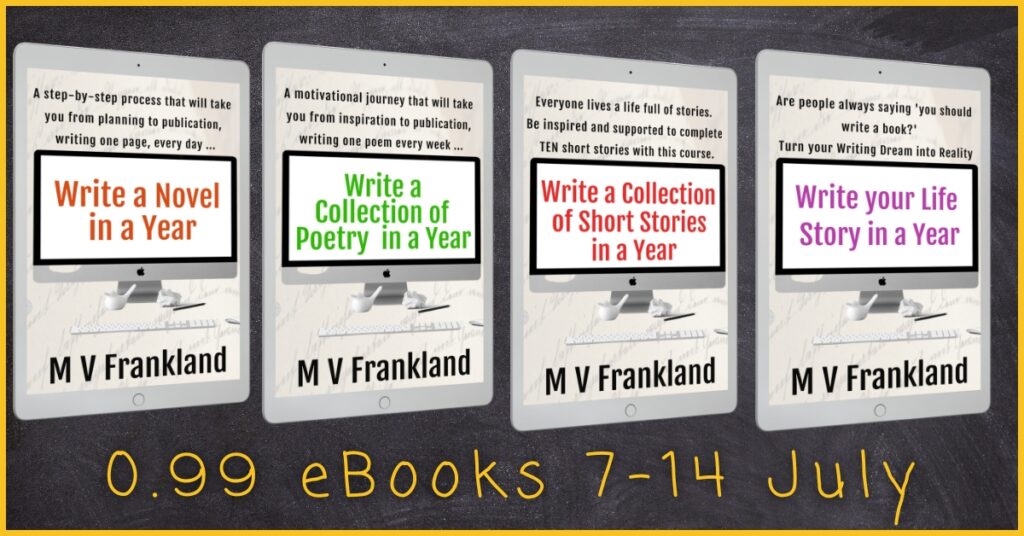Hi there and a very warm welcome to July’s Writerly Witterings. This month I’m going to discuss how enlisting the support of others can be of massive benefit, whatever stage you’re at in your writing journey.

There's no doubt that writing can be an extremely solitary activity where we are forced to rely on our own judgement and instincts as to whether our writing is any good.
There are some days when I reach my word count and am really happy with what I’ve written, then there are others where I’m thinking – ‘this is a load of rubbish!’
Peer Assessment
In my face-to-face teaching of creative writing, towards the end of my courses, I always encourage peer assessment – and this goes beyond merely reading work aloud and everyone saying ‘yes, that’s brilliant.’
I support the writers I work with to comment on what works in another's writing, but also on what can be improved. It’s how we all grow. Even in my online courses, I encourage this process in the Facebook groups which support each course.
Peer assessment is a win/win process for both the giver and the receiver of feedback. As a writer, I welcome both the positive and not-so-positive comments from other writers and my readers, and I also enjoy the times when I read the writing of others through my online courses.
But this is just one way of enlisting support for yourself as a writer. I don’t know of any other profession that is potentially open to what can be, a difficult level of rejection and opinion from publishing professionals and ultimately readers.
Your Dream Team
You only have to look at reviews on any book on Amazon to see how wide-ranging this opinion can be. This is why we need a dream team. Here’s mine:
- Writing buddy(ies) or a writing circle The only problem with having a writing buddy is that you have to be disciplined not to spend the time chatting! But having a buddy can keep you accountable, provide companionship and offer someone to bounce ideas around with. I haven’t had as much chance to get together with my writing buddy lately – JA Browne (Author of Hannah and the Hollow Tree.)
- First reader(s) This is a trusted person who will take your work when it’s at an early stage and tell you if it works, or not! You need someone who knows what they’re talking about and will be brutally honest when it’s needed. In my case, it’s my husband Michael and yes, his honesty has now and again been brutal! But it’s what we need as writers.
- Mentor(s) Mentors don't even need to know you! I have a couple of authors whose processes and journeys I admire and from whom I do lots of learning. Joanna Penn, Stephen King and Mark Dawson spring to mind. They are all thriller writers like me, though they’ve written a heck of a lot more books, both fiction and non-fiction, all of which I devour. We all need people to learn from and aspire to.
- Cover Designer. If you’re writing a book, you’re possibly not an artist as well – unless you’re super talented! Your cover should be given some thought even whilst at first draft stage, as it makes whatever you’re working on more of ‘a thing.’ I’m very lucky to have Darran Holmes as my cover designer - even from a simple cover brief, he seems to be able to capture exactly what’s going on in your head.
- Editor(s) Again, I’m lucky in that my husband fulfils this role. With my first novel, The Man Behind Closed Doors, I had editorial support whilst doing my MA in Creative Writing at Leeds Trinity University. Certainly with a first novel, poetry collection or autobiography, editing at some level is essential. You’ll struggle to reach a publishable level completely on your own as a new writer and should get as much expertise as you can.
- Proof Readers I have an amazing group of readers, (my Advance Reader Team,) who receive an late-stage advance copy of all my novels and not only offer feedback on the story, but also catch those pesky typos which slip through the editorial and formatting process. They’re even more wonderful in that they’re the first to post early reviews for each book I release. I don’t know what I’d do without them. I would advise you assemble your own group of avid readers who’ll give your work the once over once you’ve got it to the best place you can by yourself first. This gives you a greater chance of acceptance from a publisher or literary agent if planning to go the traditional route. And if you’re planning to go the independent route, you absolutely need as much proof reading as possible.
- Readers Without readers, an author is nothing – well that’s my philosophy anyway. There is some work I write and have written in the past that will never see the light of day but most of what I write, I do with a reader in mind, even at first draft stage. I see my writing process as only being half complete when I’m ready to publish. It’s readers who complete the process, when they bring the story or poem alive within their own imagination.
There’s no time like the present to start assembling your own dream team! It might differ to mine but it’s important that you surround yourself with people who'll support you as a writer and believe in what you are doing. It makes a huge difference.

Here’s some steps you can take to start this:
- Identify a local or online writing group/circle to share ideas and inspiration and feed back on each other’s work. Alternatively find yourself a writing buddy. Preferably someone who writes in a similar genre to you and is at a similar stage in their writing career.
- Who can you show your early work to? Who can you trust to offer an honest opinion? Critical feedback can be hard to take at first but it’s a necessary part of development as a writer.
- Which author inspires you? Who can you learn from? Whose advice do you trust? If you can find an author whose writing you enjoy but you can also learn something from in terms of the craft and business of writing, then get following them!
- Think about the cover of your book in progress It’s never too early to start thinking about the physical appearance of your book. Aspects like illustrations, blurb, colours and titles can really help you visualise your writing as a finished product. How empowering is that?
- Look around for editing opportunities Take every opportunity to receive professional feedback on your writing. Sometimes, you can receive this through reading your work aloud at writing workshops and at spoken word events. Some writing competitions will offer feedback as part of the entry fee. A professional critique on a whole novel can run into many hundreds of pounds, but even if you only have a small section of your writing looked at, much of the advice you received can be applied to the rest of your writing.
- Begin assembling a proof reading team Gather a team of readers who might enjoy what you write. This can be family, friends and fellow writers to start with. It will grow over time but helps you catch things like typos, inconsistencies, repetition and other errors that might get in the way of your book’s chance of success. I also use a tool called ProWriting Aid as an electronic proof reading tool but this is no substitute for real human beings!
- Lastly, and very excitingly, think about who your ideal reader might be. Make some notes about who you’re writing for in terms of gender, age, demographics and life experience. Then begin building a list of readers who will await your work when it’s ready.
If you can follow some or all of the ideas above, I promise you’ll feel hugely empowered as a writer. We can’t do it all on our own. Gone are the days of tapping away on a manual typewriter, bundling up the manuscript with a ribbon and getting snapped up by a publisher with a ready made army of readers. Nowadays you really do need your very own dream team.
Over to You
Have you already put some of the ideas I’ve offered into practice? I’d love to know so feel free to respond in the comments.
For some help in the craft itself of reaching completion of a large writing project, look no further than my how-to books for writers, all available in eBook, paperback and hardback with a companion workbook. Between July 7th and 14th you can snap up one of the course books (which are a distilled version of my year-long courses) for just 0.99.
My latest free course on YouTube, The 10 Days of Holiday Writing starts on 9 June 2021 and you can click below for day one.
There is a Facebook group to share and celebrate your individual response and I look forward to sharing your sunshine and happy holiday memories.
Enjoy the rest of your writing month and I’ll see you next time. I release a blog post on the 8th of every month.
Bye for now.
With very best wishes,
Maria
PS: This blog post is also available as a You Tube video.
GET A FREE BOOK!
Click below to join my 'keep in touch' list and receive your FREE copy of 'The 7 S.E.C.R.E.T.S. to Achieving your Writing Dreams.

